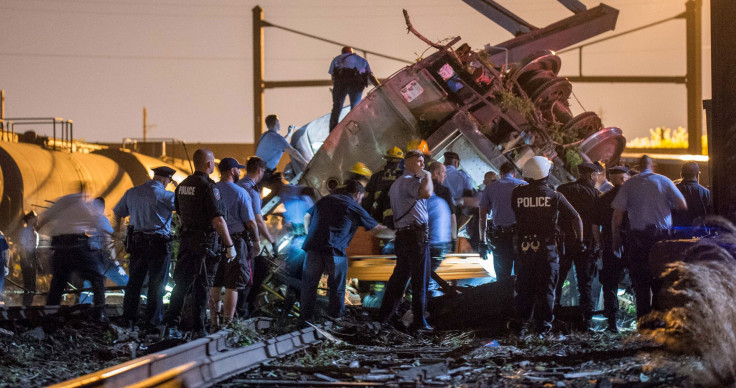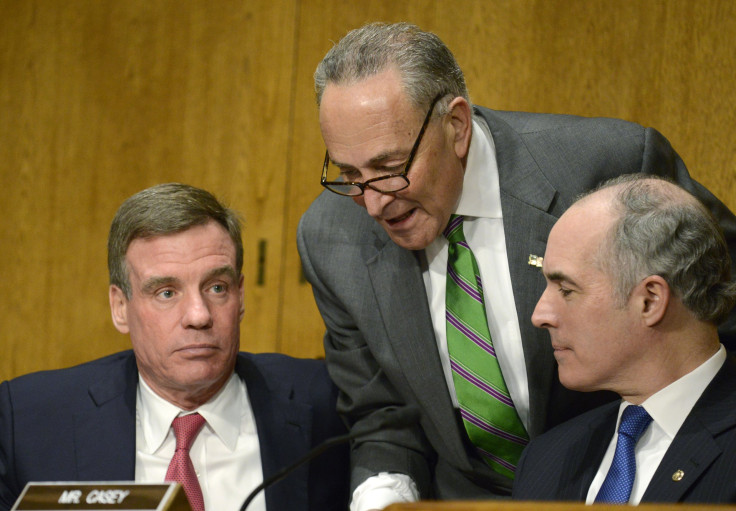Amtrak Crash Philadelphia: Senate Could Delay Train Safety Technology Installation That Would Have Saved Lives

The installation deadline for safety technology that would have avoided the deadly Amtrak derailment and crash in Philadelphia two months ago could be pushed back three years as a part of a provision added to a Senate transportation bill up for debate this week. Lawmakers and interested parties from states and regions that have high levels of Amtrak usage, including Pennsylvania, have expressed frustration and outrage toward the proposed delay. They said that the deadline extension for the safety system, called positive train control, also known as PTC, is a result of pressure from the railroad lobby, according to the New York Times.
“It should be done immediately. There shouldn’t be an extension,” said Democratic Sen. Chuck Schumer of New York, one of the highest trafficked Amtrak regions in the country. “Given the high number of accidents, and given the fact that PTC is really effective, they should stick with 2015.”
Under a 2008 law, railroad companies, including Amtrak, have until December 31 to install the safety system. But many railroads across the nation have still not phased in positive train control and would face federal face fines if they did not meet the deadline by the end of the year.
Sen. Richard Blumenthal, D-Conn., said extending the deadline to 2018 would make the safety system “essentially a mirage.” Sen. Bob Casey, D-Penn., said the “idea that a provision to delay positive train control was slipped into this bill just a short time after the Amtrak 188 derailment is shocking and wrong. Delaying PTC is a bad idea, and this provision should be stripped out immediately.”
The Senate transportation bill would avoid a funding shortfall for highway transportation and infrastructure projects for the next three years. Current funding could expire this summer.

This is not the first time that implementing the safety systems has been delayed. Just weeks before the train derailment in Philadelphia that killed eight people and injured about 200 more, Congress moved on a bill that would have further delayed positive train control for another five years even though watchdogs had repeatedly said that the trains were increasingly unsafe, and federal transportation authorities had said just the year before that “everybody on a train is one human error away from an accident.”
Positive train control works by sending signals to an information hub that then can automatically slow a train down if it is traveling too fast and is approaching a turn in the tracks. The train that crashed two months ago was traveling at speeds in excess of 100 miles per hour when it hit a curve and derailed.
Mark V. Rosenker, a former chairman of the National Transportation Safety Board, told the Times it seemed obvious that railroad industry lobbyists had gotten their way with Congress on the proposed deadline delay.
The Association of American Railroads, which includes some of the country’s largest rail companies including Amtrak, gave nearly a quarter of a million dollars to candidates for national office in the 2014 cycle, according to data from the Center for Responsive Politics. Republicans, who control both the Senate and House of Representatives, received 58 percent of that money. The railroad association spends big on lobbying, too, and in 2014 spent $6.5 million to influence and monitor federal legislation.
Among the legislation that the Association of American Railroads supported this year is the bill that moved in Congress to delay positive train control before the crash. Missouri Republican Sen. Roy Blunt, the chief sponsor of the legislation, received $290,000 in campaign funds from the railroad lobbying group, making him the fifth biggest recipient in the Senate, according to data from the Center for Responsive Politics.
An investigation by the International Business Times following the crash indicated that Amtrak and the watchdog arm tasked with keeping track of safety concerns for the commuter rail company, which is tied closely to Congress as it is federally subsidized, had been warning that not installing positive train control was a danger for years. Amtrak, after a 2008 mandate to install the safety systems, had struggled to get ahold of bandwidth for the signals that are carried from the train to the information hubs.
Those who back the delay for the deadline say that installing this technology for thousands of miles of tracks is time consuming and costly.
© Copyright IBTimes 2025. All rights reserved.






















